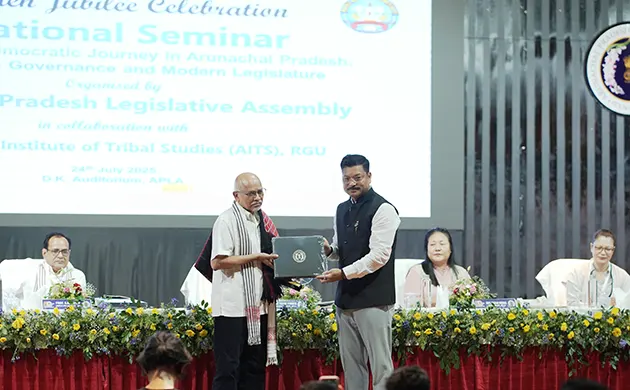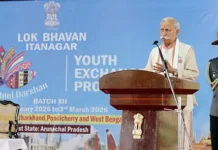ITANAGAR, 24 Jul: A national seminar titled ’50 Years of Democratic Journey in Arunachal Pradesh: Indigenous Governance and Modern Legislature’ was held on Thursday at the DK Convention Hall here to mark the golden jubilee of the Arunachal Pradesh Legislative Assembly (APLA).
The event was jointly organized by the APLA and the Arunachal Institute of Tribal Studies (AITS), Rajiv Gandhi University (RGU).
In her welcome address, AITS Assistant Professor Dr Zilpha Modi described the occasion as “a moment of reflection and celebration of challenges,” highlighting the academic and historical significance of 50 years of democratic evolution in the state.
Speaker Tesam Pongte in his address reflected on the Assembly’s journey from its inception on 15 August, 1975 to becoming a full-fledged legislative body in 1987. He called the Assembly “the epicentre of constitutional values and diverse voices,” acknowledging the contributions of past and present legislators. He also announced upcoming youth-focused events, including a youth parliament on 26 July and a conclave on 28 July, aimed at fostering dialogue on development, environment, and sustainability.
AITS Director Prof Jumyir Basar emphasized that the seminar is “a reflection of our collective journey from traditional tribal self-governance to modern legislative democracy.”
She noted the event’s dual purpose – celebrating 50 years of democratic milestones, and critically analyzing the role of legislative governance in shaping Arunachal’s future.
The keynote address by renowned sociologist Prof Virginius Xaxa delved into the historical, cultural, and political evolution of Arunachal and its indigenous tribes. Prof Xaxa urged policymakers to rethink colonial narratives that have long shaped perceptions of tribal identity, stating, “Identity must not be seen as lost or diluted, but as evolving.” He stressed the importance of reclaiming indigenous rights, culture, and history while ensuring inclusion in democratic frameworks.
RGU Vice Chancellor Prof SK Nayak in his address called the 50-year milestone both a moment of celebration and introspection. He emphasized that “democracy is meaningful only when it improves the quality of life for ordinary citizens,” noting the significant socioeconomic progress Arunachal has achieved in recent decades.
The seminar’s discussions were structured around three key themes: legislative Assembly and tribal representation; civil society and the state; and bureaucracy and the state. It served as a platform for meaningful dialogue on public policy, cultural preservation, and social transformation.
The speakers and their topics in the first technical session of the seminar on ‘Legislative Assembly and Tribal Representation’ were: Former home minister James Lowangcha Wanglat – The Making of the Arunachal Legislative Assembly; RGU Prof Nani Bath – Tribal Autonomy and the Political Transition of the State; politician and social activist Jarjum Ete – Women’s Representation and Political Leadership in Arunachal; Vice-Chancellor Alipurduar University, West Bengal, Prof Sarit K Chaudhuri – Evolving Tribal Situation in Arunachal Pradesh.
During the second session (Institutions, Voices, and Change: The Making of Modern Arunachal Pradesh), the resource persons and their topics were: Writer Mamang Dai – Voices of the Land: Indigenous Literature and the Shaping of State Identity; TRIHMS Director Dr Moji Jini – Public Health in Arunachal: From Malaria to Polio Eradication; CCF Samuel Changkija – Environment, Traditional Ecological Knowledge, and the Evolution of Environmental Laws; and senior journalist Tongam Rina – Media, Accountability, and the State.


